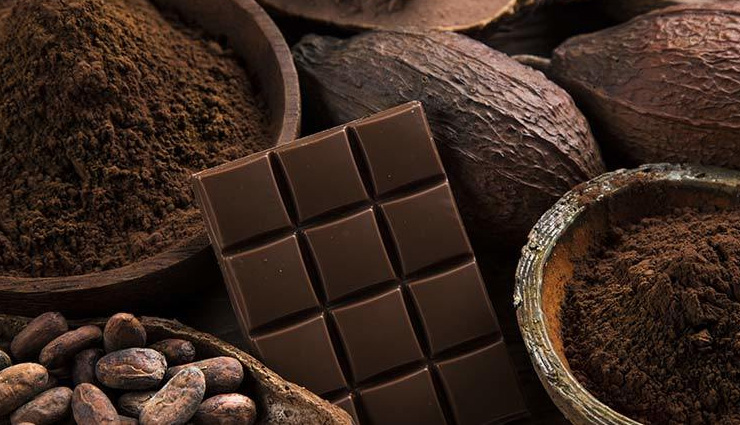- Home›
- Healthy Living›
- World Chocolate Day 2023: 8 Health Benefits Of Eating Chocolate
World Chocolate Day 2023: 8 Health Benefits Of Eating Chocolate
By: Priyanka Maheshwari Fri, 07 July 2023 09:16:16

As chocolate enthusiasts celebrate World Chocolate Day, it's important to remember that indulging in this beloved treat can offer more than just a delightful taste experience. Scientific studies have highlighted several potential health benefits associated with consuming chocolate in moderate amounts. From improved heart health to enhanced mood, the positive effects of chocolate extend beyond its delectable flavor. So, let's dive into the 8 health benefits of eating chocolate and discover why this sweet delight can be a guilt-free pleasure. However, it's essential to remember that moderation is key. Opt for dark chocolate with a higher cocoa content, as it contains more beneficial compounds and less sugar. So, indulge in the goodness of chocolate on this special day and embrace its potential health-enhancing effects while savoring every delicious bite. Happy World Chocolate Day!

# Rich in Antioxidants
Chocolate, especially dark chocolate with a high cocoa content, is loaded with antioxidants known as flavonoids. Flavonoids belong to a larger group of antioxidants known as polyphenols, which are found in various plant-based foods. Dark chocolate, in particular, contains a higher concentration of flavonoids compared to milk chocolate or white chocolate. Flavonoids help to neutralize free radicals, which are unstable molecules that can cause oxidative stress and damage our cells. By scavenging these free radicals, flavonoids contribute to reducing oxidative stress and inflammation in the body.
Research suggests that the specific flavonoids present in chocolate, such as epicatechin and catechin, have beneficial effects on cardiovascular health. They can help improve blood flow, promote the dilation of blood vessels, and reduce the risk of heart disease. Flavonoids in chocolate may also contribute to the prevention of blood clots and the reduction of LDL ("bad") cholesterol levels.

# Cardiovascular Health
Chocolate, particularly dark chocolate, has been associated with potential benefits for cardiovascular health. Flavonoids present in chocolate have been shown to help lower blood pressure. They promote the dilation of blood vessels, allowing for better blood flow and reduced resistance. This effect can help lower both systolic and diastolic blood pressure levels. Chocolate consumption has been linked to improved blood flow and increased nitric oxide levels. Nitric oxide is a compound that helps relax and widen blood vessels, improving circulation and reducing the risk of clot formation.

# Mood Booster
Indulging in chocolate can have mood-enhancing effects. Chocolate consumption can trigger the release of endorphins in the brain. Endorphins are chemicals that naturally promote feelings of pleasure and happiness. The presence of certain compounds in chocolate, such as phenylethylamine (PEA), stimulates the release of endorphins, creating a sense of well-being. Chocolate contains tryptophan, an amino acid that helps increase serotonin levels in the brain. Serotonin is a neurotransmitter that plays a crucial role in regulating mood, happiness, and overall emotional well-being. Higher serotonin levels are associated with improved mood and reduced symptoms of depression and anxiety.

# Cognitive Function
Studies indicate that the flavonols in chocolate may have positive effects on cognitive function and memory. Dark chocolate consumption has been associated with improved blood flow to the brain. The flavonoids in chocolate promote the dilation of blood vessels, increasing blood flow and oxygen supply to the brain. This improved circulation can support cognitive processes, including attention, memory, and learning. The flavonols in dark chocolate have been linked to improved memory and cognitive performance. Research suggests that regular consumption of dark chocolate may enhance memory, attention, and information processing speed. It can also help with cognitive tasks that require focus and concentration.

# Reduced Inflammation
The anti-inflammatory properties of chocolate's flavonoids may help reduce inflammation in the body, which is linked to various chronic conditions. The flavonoids found in chocolate, such as epicatechin, have been shown to possess anti-inflammatory properties. They can help modulate the activity of certain inflammatory pathways in the body, reducing the production of pro-inflammatory molecules. Some studies have suggested that regular consumption of dark chocolate may lead to a decrease in CRP levels, indicating a reduction in systemic inflammation.

# Improved Blood Sugar Control
Contrary to popular belief, moderate consumption of dark chocolate has shown potential benefits for blood sugar control. Dark chocolate has been found to enhance insulin sensitivity, which is essential for the body's ability to effectively regulate blood sugar levels. Improved insulin sensitivity means that cells are more responsive to insulin, allowing for better uptake and utilization of glucose. Dark chocolate typically has a lower glycemic index compared to other sweet treats, indicating a slower and more gradual increase in blood glucose levels after consumption. The glycemic index (GI) is a measure of how quickly a carbohydrate-containing food raises blood sugar levels.

# Mineral Content
Chocolate contains essential minerals such as iron, magnesium, and copper. These minerals play crucial roles in maintaining healthy bodily functions, including oxygen transport, bone health, and enzyme activity. Magnesium is essential for various bodily functions, including energy production, muscle function, and bone health. Consuming chocolate with higher cocoa content increases the magnesium content. Additionally dark chocolate generally has a higher iron content compared to milk chocolate or white chocolate. Iron is an essential mineral involved in oxygen transport, immune function, and the production of red blood cells. Chocolate, particularly dark chocolate, can provide a modest amount of copper also. Copper is a trace mineral that plays a vital role in iron absorption, connective tissue formation, and the functioning of enzymes involved in energy production.

# Skin Health
Certain antioxidants found in chocolate, such as flavonoids, may contribute to healthier skin by protecting against damage caused by UV radiation, improving hydration, and promoting a more youthful appearance. Dark chocolate also contains healthy fats, such as cocoa butter, which can help improve skin hydration and support the skin's barrier function. Adequate hydration and a well-functioning skin barrier are essential for maintaining skin health and preventing dryness and irritation.





